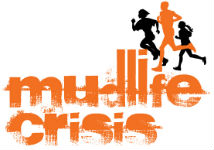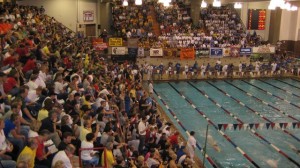I’ve mentioned before that my wife is an age-group swim coach for our local YMCA. It’s a part-time gig that she loves, and when it came up I encouraged her to take it because she does love it so much and I knew she missed having swimming in her life (she was a participant and also a coach when she was younger and, like many things of our youth, that was lost when she started her “real” jobs and the like). She’s very good at it, and it’s always great to help her out at a swim meet with volunteering as timers and the like.
But… unless you’re the actual kids in the water, you’re not going to get a lot of movement throughout the day other than walking to and from the poolside to watch your kids swim (and that’s if you’re not volunteering at the meet!). And frankly, when you’re used to getting movement throughout the day on a regular basis, going to a weekend of not getting that is quite the adjustment, and it can really affect your days follow the meet.
(Obviously, this can go for ANY event where your kids are participating and you are a spectator or volunteer. And with today’s culture of organized sports and activities for our kids, it’s hard to not have such situations thrust upon us.)
Case in point: this past weekend was our league’s championship meet, so it was a big event, with swimmers from all over Ohio and West Virginia. There were lots of great swims, and lots of parent volunteer involvement by all the teams (unlike most meets where one team hosts and provides all the volunteers). And I, as the self-proclaimed “Michelle Obama” of the team, was called upon to do something I frequently excel at: talk a lot. Yes, I was the announcer for day three of the meet. And it was fine – she asked me, I said that would be okay, and that was that. I was happy to help out.
But what I wasn’t expecting was the near absolutely complete lack of movement that the job was going to entail.
First, the scoring table, where I was sitting, was basically a box where I was penned in with about nine square feet of space to move. Okay, maybe sixteen. Somewhere in there. It was not a place where regular full-body movement was a possibility. I had a rolling office type chair, and with all the cords on the floor for the computer I was working on, the microphone, and all the of cords coming from the timing equipment going up to those computers and such, even rolling back too far wasn’t an option. I was stuck.
Second, I was basically responsible for keeping the swim meet going. The announcer is in charge of announcing each event and the heats for each event, and when the maximum time for a heat was about 2 1/2 to 3 minutes – during which I was frequently announcing results of previous events – there wasn’t much time to get in a break, especially if you had to climb over a bunch of people who were trying to work on the meet computers.
So I had no room to move, other than to stand up slightly, and I was stuck there. So this was not a movement-friendly situation.
And to be frank, today I am wiped out. Tired, mildly headache-y, and stiff.
When you’re used to movement, it’s hard work to not move! It raises the stress level (especially when everyone’s working to keep the meet going and the stress level is already fairly high) and lowers the ability to move that cortisol through the system. And of course, we were in a hotel for the weekend with the whole family, so rest was not great. And food was so-so. I brought some stuff with me for healthy fats and the like, but I was still eating primarily restaurant food. Even with my efforts to get lettuce wraps at Red Robin and making sure I got a salad at Chipotle at another meal, it was still not great.
So what can we do about this to avoid feeling the post-weekend blahs? And this can go for any sporting event for which you’re volunteering (or even just being a spectator!).
- Take breaks when possible, and especially when offered. I’ll be perfectly honest, I was offered a break during the day and didn’t take the offer because I thought I was feeling okay. And at that time, I was. I was a little bit stiff by the end of the session. But had I gotten away from the noise, light, cramped space, and sitting for a few minutes and just stretched or done some light movement, I’d have been in so much better a situation. I could even have just popped out into the bleachers for a minute during a couple of the longer swims and walked up and down the steps a couple of times.
- Drink water. Part of my issue today is that I was a bit dehydrated. I think I had coffee for breakfast and then a bottle of water during the meet, and that was it. Bad move. When we got home from the meet, I did my best to down a big water bottle but it was a bit of too-much-too-late.
- Dress for the occasion. It’s hot in a natatorium, especially the higher up you get in the stands. We were located about halfway up, and it was really toasty. I was wearing a cotton t-shirt and jeans. Bad move. While I wasn’t actively uncomfortably sweating, I was losing fluids, for sure. A tech shirt of some kind, shorts, and sandals or Vibram Fivefingers would have been ideal for the situation. And jeans were not a good choice for doing a lot of movement had I taken the opportunity.
- Do what you can to keep on schedule. Sleep is obviously a big factor, as well. I did as much as I could do to keep our situation normal throughout the weekend including timing of sleep and making our environment as normal as possible. I even brought my essential oils diffuser and set that up with the blend we usually use for night-time. Granted, we were in a hotel which is never the same, especially with a whole family with excited kids in two double beds, but we did what we could (including my tersely berating the folks in the hallway who were making a rather exorbitant amount of noise at one point).
So while I’m slowly getting back to normal today, it’s still an annoying process to have to go through. But we all love our kids, and OCR isn’t the only thing we do with them most of the time. Figure out ways to keep moving, keep your schedule normal, keep a healthy lifestyle, and make you and your family happy.
What tips do you have for parents who have lots of events to work through with kids? Share below in the comments!







